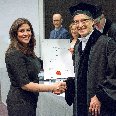Geospatial Science for Global Impact
ITC empowers communities, institutions, and individuals to create sustainable, data-driven solutions through research and inclusive partnerships. Our Research Programme is dedicated to harnessing the power of geospatial data and earth observation and helping solve the world’s most pressing challenges through innovative geospatial solutions. With a strong focus on countries with lower Human Development Index, we aim to provide actionable, high-quality geospatial information that supports sustainable development.
The ITC research programme is committed to:
- Addressing real-world sustainable development challenges
- Strengthening local capacity in partner countries
- Driving innovation in geospatial science and technology
Research Disciplines
Our research is structured around our six scientific departments, each contributing to our four impact domains.
These research disciplines align with the international research agenda and ITC’s capacity-building and knowledge-development mission.
Multidisciplinary Research Teams
Each research discipline is led by one or more ITC professors and supported by:
- Expert staff members
- PhD candidates
- MSc students acting as apprentice researchers during their thesis research
This integrated approach ensures that students, researchers, and partners contribute collaboratively to developing new tools, methods, and insights in geo-information science.
PhD Research
A Supportive and Dynamic Doctoral Community
All PhD candidates at ITC are enrolled in the Twente Graduate School (TGS), where they benefit from a vibrant academic environment and access to national and international networks.
Highlights include:
- Student-led initiatives: PhD students are encouraged to organise events and activities that enrich academic and scientific life.
- Specialised PhD training: Custom PhD courses support doctoral candidates' academic and professional development.
- National collaboration: Engagement with Dutch national graduate schools connects students to the broader research community and enhances their learning through a robust national knowledge infrastructure.
IT and Data Infrastructure
Cutting-Edge Facilities for World-Class Research
As a leading remote sensing and geographic information systems (GIS) centre, ITC maintains state-of-the-art IT and data infrastructure to support research and education.
Key components include:
- Strategic data policy: A comprehensive policy guiding the management and use of big and open data, aligned with current trends in data science.
- Centralised data management: Institution-level oversight of ITC’s data resources ensures accessibility, integrity, and long-term value.
- Laboratory renewal: Facilities are regularly reviewed and upgraded based on evolving departmental needs.
- Technology planning: Multi-annual equipment programming ensures researchers and students have access to cutting-edge tools and technology.


